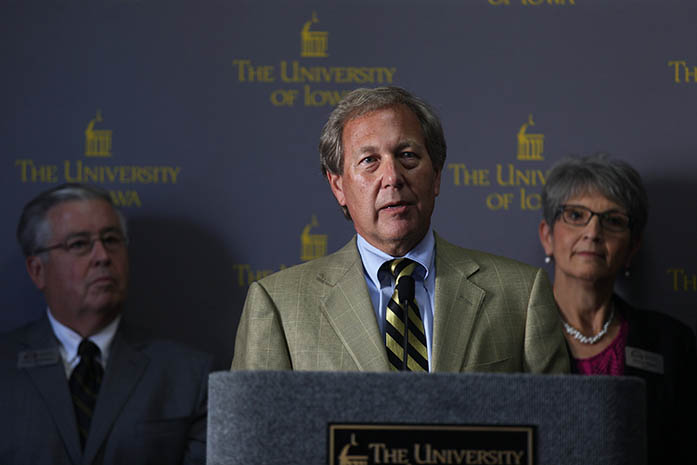Judge decides Iowa regents’ meetings with UI President Harreld do not violate law
A judge has sided with the state Board of Regents, dismissing the case regarding five regents’ private meetings held with UI President Bruce Harreld in July 2015.
FILE – UI President Bruce Harreld addresses the crowd during a meeting in the IMU on Thursday, Sept. 3, 2015 after being selected 21st president of the UI. (The Daily Iowan/file)
October 30, 2017
A 5th District judge issued a ruling Monday that two current and three former regents did not violate Iowa’s Open Meetings Law by meeting with Bruce Harreld prior to hiring him as University of Iowa president in 2015.
Plaintiff Gerhild Krapf, a former UI employee, alleged former Regent President Bruce Rastetter’s private meetings with Harreld during the presidential search process in 2015 were a violation of Iowa Open Meetings Law.
Defense attorneys filed a motion Oct. 27 to postpone the court case that raised questions over the legality of the regents’ meetings with Harreld after previously moving for summary judgment to drop the case ahead of a Nov. 6 nonjury trial date.
Fifth District Court Judge William Kelly did not immediately rule on the defense attorneys’ request to drop the case at an Oct. 6 hearing, but granted the defense attorneys’ request Monday.
“It may have looked problematic in the way Rastetter organized the recruitment of Bruce Harreld, but ultimately, the Board lacked the numbers needed for a meeting throughout the recruitment process, and no evidence exists that they deliberated or acted under the statute as Plaintiff alleges,” Kelly said in the ruling.
Rastetter acknowledged in depositions that the meetings were coordinated in such a way so as to circumvent open-meetings law. Harreld met with regents no more than two at a time with Mary Andringa, Larry McKibben, Milt Dakovich, and Katie Mulholland, because meeting in this manner would avoid constituting what Iowa Code 21.2(2) defines as a “meeting.” A meeting would require a majority of the nine-member governing board to be present at one time.
Gary Dickey, Krapf’s attorney, argued that while the regents never met in a physical majority, they met in close temporal proximity. Dickey argued this constitutes “serial submajority gatherings” due to the back-to-back manner in which the meetings were held at Rastetter’s Summit Agricultural Group office in Ames on July 30, 2015.
RELATED: Regents’ secret meetings case ‘old news,’ Harreld tells UI faculty member
Kelly, however, said “the only way to get to a ‘meeting’ under the definition is that there was a sequential meeting,” according to the ruling. He ruled that Harreld did not act as an agent of the board; did not “meet” or engage in deliberation July 30, 2015; and that there is no third category of “meetings” in Iowa Code 21.2(2) as the plaintiff attempted to argue.
“Although this arrangement to provide information to and recruit Bruce Harreld may look like the Defendants were trying to avoid the purposes of the Iowa Open Meetings Act, undisputed facts were not proven to support the contention that these Defendants violated Iowa law,” Kelly found.
Krapf has filed a notice of appeal in response to Kelly’s decision, defense attorney Richard Sapp, who represents former regents Rastetter, Mulholland, and Andringa, told The Daily Iowan. He said the defense attorneys are ready to defend the appeal.
“My clients are very pleased and I am as well,” Sapp said. “I think the court correctly applied Iowa law in dismissing these allegations, because … [these events] don’t create any meeting of the majority of the Board of Regents, nor was there any deliberation or decision made on anything in any way.”
Dickey said in an email to the DI he is confident the ruling will be reversed.
“This question in this case is whether the Board of Regents can structure back-to-back-to back meetings in order to keep it hidden from the public,” he wrote. “That’s a question of first impression that the Iowa Supreme Court has to decide. The district court’s ruling clears the way for that to happen without the time and expense associated with a trial.”



